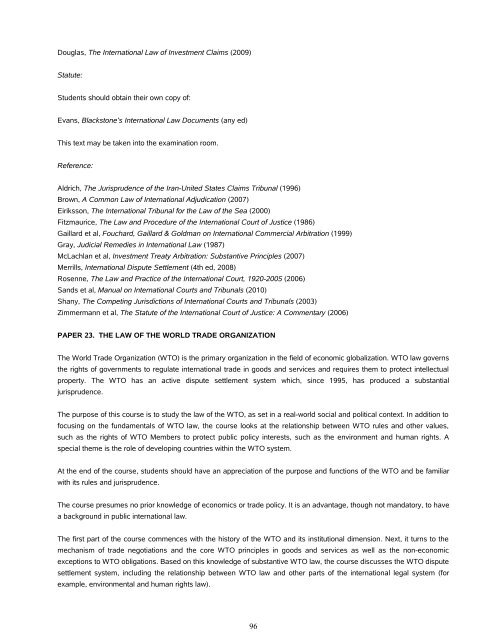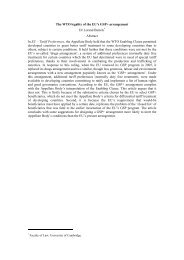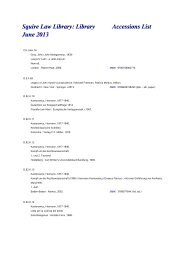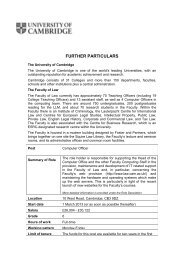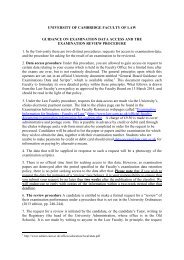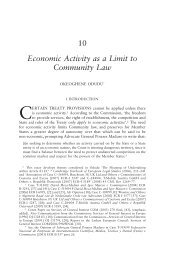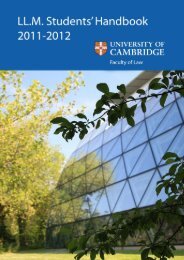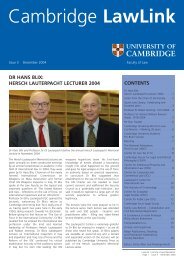Douglas, The International <strong>Law</strong> <strong>of</strong> Investment Claims (2009)Statute:Students should obtain their own copy <strong>of</strong>:Evans, Blackstone’s International <strong>Law</strong> Documents (any ed)This text may be taken into the examination room.Reference:Aldrich, The Jurisprudence <strong>of</strong> the Iran-United States Claims Tribunal (1996)Brown, A Common <strong>Law</strong> <strong>of</strong> International Adjudication (2007)Eiriksson, The International Tribunal for the <strong>Law</strong> <strong>of</strong> the Sea (2000)Fitzmaurice, The <strong>Law</strong> and Procedure <strong>of</strong> the International Court <strong>of</strong> Justice (1986)Gaillard et al, Fouchard, Gaillard & Goldman on International Commercial Arbitration (1999)Gray, Judicial Remedies in International <strong>Law</strong> (1987)McLachlan et al, Investment Treaty Arbitration: Substantive Principles (2007)Merrills, International Dispute Settlement (4th ed, 2008)Rosenne, The <strong>Law</strong> and Practice <strong>of</strong> the International Court, 1920-2005 (2006)Sands et al, Manual on International Courts and Tribunals (2010)Shany, The Competing Jurisdictions <strong>of</strong> International Courts and Tribunals (2003)Zimmermann et al, The Statute <strong>of</strong> the International Court <strong>of</strong> Justice: A Commentary (2006)PAPER 23. THE LAW OF THE WORLD TRADE ORGANIZATIONThe World Trade Organization (WTO) is the primary organization in the field <strong>of</strong> economic globalization. WTO law governsthe rights <strong>of</strong> governments to regulate international trade in goods and services and requires them to protect intellectualproperty. The WTO has an active dispute settlement system which, since 1995, has produced a substantialjurisprudence.The purpose <strong>of</strong> this course is to study the law <strong>of</strong> the WTO, as set in a real-world social and political context. In addition t<strong>of</strong>ocusing on the fundamentals <strong>of</strong> WTO law, the course looks at the relationship between WTO rules and other values,such as the rights <strong>of</strong> WTO Members to protect public policy interests, such as the environment and human rights. Aspecial theme is the role <strong>of</strong> developing countries within the WTO system.At the end <strong>of</strong> the course, students should have an appreciation <strong>of</strong> the purpose and functions <strong>of</strong> the WTO and be familiarwith its rules and jurisprudence.The course presumes no prior knowledge <strong>of</strong> economics or trade policy. It is an advantage, though not mandatory, to havea background in public international law.The first part <strong>of</strong> the course commences with the history <strong>of</strong> the WTO and its institutional dimension. Next, it turns to themechanism <strong>of</strong> trade negotiations and the core WTO principles in goods and services as well as the non-economicexceptions to WTO obligations. Based on this knowledge <strong>of</strong> substantive WTO law, the course discusses the WTO disputesettlement system, including the relationship between WTO law and other parts <strong>of</strong> the international legal system (forexample, environmental and human rights law).96
The second part <strong>of</strong> the course covers more specialized subjects, including the regulation <strong>of</strong> product standards and <strong>of</strong> foodsafety and pests, as well as the main trade policy instruments used by governments to protect their domestic industries,ie subsidies and ‘trade remedies’, intellectual property protection, including the legal rights <strong>of</strong> WTO Members to order‘compulsory licences’ for essential medicines, and the issue <strong>of</strong> trade and finance.Finally, the course devotes three seminars to a discussion <strong>of</strong> the major subsystems <strong>of</strong> trade regulation, which existformally as exceptions to the most-favoured-nation obligation. The first <strong>of</strong> these is the Generalized System <strong>of</strong> Preferences(GSP), under which developed countries may grant preferential tariff treatment to developing countries; the second is theregulation <strong>of</strong> regional trade agreements. We round <strong>of</strong>f the course with a seminar discussing those areas in which regionaltrade agreements go beyond the subjects covered by the WTO.READINGThere are various textbooks and casebooks on WTO law. This course recommends the purchase <strong>of</strong> at least one <strong>of</strong> thetextbooks noted below, but it does not rely on either exclusively. The casebooks also contain some helpful material, but,again, the course does not rely on these.The course will be taught on the basis <strong>of</strong> weekly handouts with reading lists. These will be divided into mandatory readingand recommended reading. The mandatory reading will be mainly primary materials in the form <strong>of</strong> treaty texts, subsidiaryWTO instruments and dispute settlement reports (ie the cases). It is essential to bring these materials to class. The treatytexts are collected in The Results <strong>of</strong> the Uruguay Round <strong>of</strong> Multilateral Trade Negotiations: The Legal Texts (any edition)and it is essential to purchase this book. This book may also be taken into the final exam.Other materials, and in particular, dispute settlement reports, are not readily available and must be printed out andbrought to class. These can be lengthy. Unfortunately the <strong>Law</strong> <strong>Faculty</strong> is unable to subsidise printing costs. The materialslisted as ‘recommended reading’ do not need to be brought to class.Textbooks:Matsushita et al, The World Trade Organization (2nd ed 2006)Trebilcock and Howse, The Regulation <strong>of</strong> International Trade (3rd ed 2005)Casebooks:Van den Bossche, The <strong>Law</strong> and Policy <strong>of</strong> the World Trade Organization (2nd ed 2008)Lester and Mercurio, World Trade <strong>Law</strong> (2008)The policy and economics <strong>of</strong> international trade:This course is not an economics or trade policy course. However, a basic understanding <strong>of</strong> these matters will greatlyassist in understanding WTO law. Some useful and readable books, taking an orthodox line, are:Bhagwati, In Defense <strong>of</strong> Globalization (2nd ed 2007)Irwin, Free Trade Under Fire (3rd ed 2009)Irwin, Against the Tide: An Intellectual History <strong>of</strong> Free Trade (1996)Krugman, Pop Internationalism (1996)A more critical book is:97
- Page 2 and 3:
ContentsGeneral InformationOfficers
- Page 4 and 5:
Settlement of International Dispute
- Page 6 and 7:
Faculty AdministrationFaculty Offic
- Page 8 and 9:
The Faculty of LawLaw has been stud
- Page 10 and 11:
The LLM Degree. This degree is awar
- Page 12 and 13:
Opening Hours:Full Term: Monday to
- Page 14 and 15:
Rules Made by the Information Strat
- Page 16 and 17:
The Lauterpacht Centre for Internat
- Page 18 and 19:
Centre for Corporate and Commercial
- Page 20 and 21:
Cambridge Socio-Legal GroupThe Camb
- Page 26 and 27:
Dates of Faculty Board Meetings7 Oc
- Page 28 and 29:
Proceed with caution in reaching fo
- Page 30 and 31:
Faculty CommunicationEach year, the
- Page 32 and 33:
Law Tripos Part IA. A candidate for
- Page 34 and 35:
Prizes. The following prizes may be
- Page 36 and 37:
PAPER 2. CONSTITUTIONAL LAWA. The a
- Page 38 and 39:
Oliver, Constitutional Reform (2003
- Page 40 and 41:
Hedley, Tort (6th ed 2008)Weir, An
- Page 42 and 43:
3. Trusts and co-ownership: Concurr
- Page 44 and 45:
Brownlie, Principles of Internation
- Page 46 and 47: Elliott, Constitutional Foundations
- Page 48 and 49: Contract: covenant and debt; assump
- Page 50 and 51: Statutes:Blackstone’s Statutes on
- Page 52 and 53: For reference:Birks and Pretto (ed)
- Page 54 and 55: Foster, EU Legislation (2010-2011)B
- Page 56 and 57: PAPER 42. INTELLECTUAL PROPERTY1. I
- Page 58 and 59: 2. Property torts (conversion and t
- Page 60 and 61: (iii)Causation4. Contracts in Engla
- Page 62 and 63: Rawls, Political LiberalismRawls, J
- Page 64 and 65: Rodger and McCulloch, The UK Compet
- Page 66 and 67: Law Commission, Renting Homes: The
- Page 68 and 69: Human Rights Case DigestHuman Right
- Page 70 and 71: 3. Title at common law and in equit
- Page 72 and 73: Exemption from Professional Examina
- Page 74 and 75: Paper application available to down
- Page 76 and 77: Form of Examination and Designation
- Page 78 and 79: ‘Open Book’ Papers. Where a pap
- Page 80 and 81: LLM : Syllabuses and Lists of Recom
- Page 82 and 83: ased upon one or two leading cases,
- Page 84 and 85: Goff and Jones, The Law of Restitut
- Page 86 and 87: Butterworths’ Company Law Handboo
- Page 88 and 89: 2. The EU’s system for human righ
- Page 90 and 91: the context of environmental protec
- Page 92 and 93: European Competition Law Review (EC
- Page 94 and 95: Crawford, The Treatment of Combatan
- Page 98 and 99: Unger, Free Trade Reimagined (2007)
- Page 100 and 101: 3. Sceptics and Critics I4. Sceptic
- Page 102 and 103: The course provides an opportunity
- Page 104 and 105: (iv)(v)(vi)(vii)Is either utilitari
- Page 106 and 107: Reiman, ‘Justice, Civilization, a
- Page 108 and 109: Gardner, Introduction to the Law of
- Page 110 and 111: 1. Types of theoretical analysis an
- Page 112 and 113: 2. Specific fieldsTopics to be sele
- Page 114 and 115: The LLM (one-year taught postgradua
- Page 116 and 117: As part of the requirements for the
- Page 118 and 119: Teaching Members of the Faculty of
- Page 120 and 121: MC Elliott, MA, PhD (Cantab); St Ca
- Page 122 and 123: RA Melikan, BA (Mich), JD, MA (Chi)
- Page 124 and 125: BD Sloan, MA, LLM (Cantab); King’
- Page 126 and 127: Law Teachers in the Department of L
- Page 128 and 129: Murray Edwards College. Dr S Turenn


